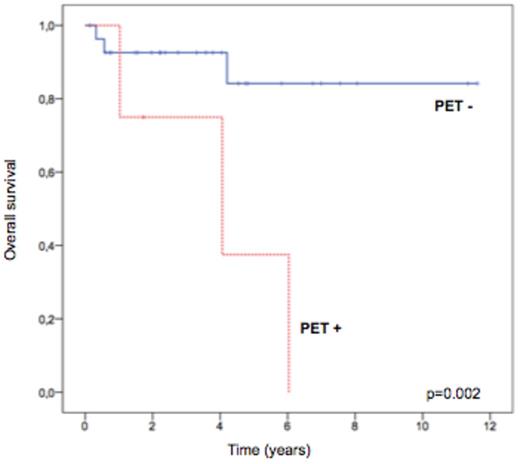Abstract
Despite high-dose therapy followed by autologous stem cell transplantation (ASCT), roughly 50% of patients with relapsed or primary refractory Hodgkin lymphoma can be cured. To identify poor risk patients who could benefit from post-ASCT treatments, we carried out an analysis of 32 patients treated at Saint-Antoine Hospital. The study included 18 males and 14 females with a median age of 31.8 years (range, 17.5-64.8). Ann Arbor staging was I-II in 14 patients and III-IV in 18 patients. Only 2 patients did not have adverse prognosis factors at diagnosis. Sixteen patients had received more than 1 salvage therapy (ST) prior ASCT, among whom 4 patients had received Brentuximab-Vedotin. Patients were evaluated with computed tomography and fluorodeoxyglucose-positron emission tomography (PET) prior to ST and again before ASCT. Relapse had occurred less than 12 months after the 1st treatment in 17 patients. Twelve patients had never achieved complete remission before ASCT. Disease status at transplant was complete remission in 16 patients, partial response in 16 patients and progressive disease in 1 patient. TEP was positive in 4 patients.
After a median follow-up of 66,9 months (12.6-139.4), the cumulative incidence of relapse was 43.75%, the event-free survival (EFS) 50% and the overall survival (OS) 81.2%. PET status before ASCT clearly identified poor risk patients (5-year OS 25% and 89.3% for PET-positive and negative patients respectively, p=0.002) and was the only significant factor associated with OS by multivariate analysis [HR: 6.52; 95% CI 1.3-32.67] (p=0.023).
In conclusion, pre-ASCT PET status appears to be the main prognosis factor in patients with relapsed or refractory Hodgkin lymphoma. Studies evaluating new conditioning regimens, post-ASCT maintenance with Brentuximab-Vedotin or tandem allogeneic stem cell transplantation are warranted for pre-ASCT PET-positive patients.
Overall survival according to TEP status at transplant (log-rank P value)
Overall survival according to TEP status at transplant (log-rank P value)
Coppo:Novartis: Consultancy, Membership on an entity's Board of Directors or advisory committees.
Author notes
Asterisk with author names denotes non-ASH members.


This feature is available to Subscribers Only
Sign In or Create an Account Close Modal